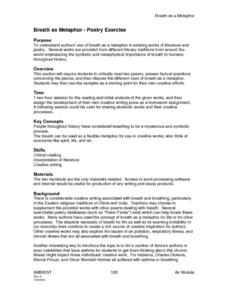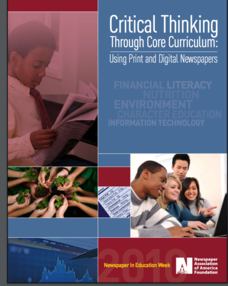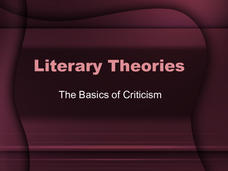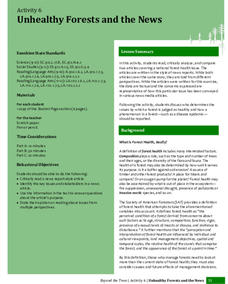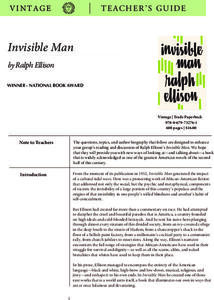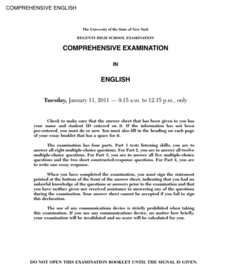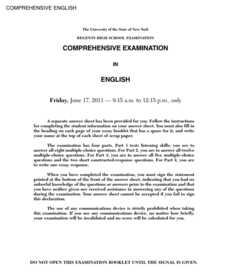University of North Carolina
Religious Studies
What is the difference between religion and religious studies? Readers find out after reading an online handout. It outlines common assignments in religious studies classes, such as critically evaluating religious texts and writing...
Curated OER
Breath as Metaphor - Poetry Exercise
Students are required to critically read two poems, answer factual questions concerning the pieces, and then discuss the different uses of breath as a metaphor. They use the samples as a starting point for their own creative efforts.
Curated OER
Real and Fictional Wolves
Learners demonstrate understanding of the difference between real and fictional wolves through critical reading and comparisons while using a Venn Diagram.
Curated OER
Earthquake preparation: Acquiring knowledge about different ways to prepare for earthquakes
Students develop critical reading comprehension skills while learning how to be prepared for earthquakes, and list at least three things they can do to prepare for an earthquake.
Macmillan Education
Critical Thinking
Encourage learners to think deeply about the information they read or hear. Through a series of life skills worksheets, your pupils will consider the need for objectivity, identifying missing information, and problem solving.
Newspaper Association of America
Critical Thinking through Core Curriculum: Using Print and Digital Newspapers
What is and what will be the role of newspapers in the future? Keeping this essential question in mind, class members use print, electronic, and/or web editions of newspapers, to investigate topics that include financial literary,...
Novelinks
Touching Spirit Bear: Question Answer Response Strategy
What types of questions help readers learn the most? Sixth, seventh, and eighth graders learn how to ask four types of questions from the Question Answer Response (QAR) reading strategy to help grow their comprehension of Touching Spirit...
Livaudais-Baker English Classroom
Literary Theories
Introduce ELA scholars to the basics of literary criticism with a 41-slide presentation that identifies eight different approaches to critical analysis. Each approach is defined, and advantages and disadvantages are listed. Also included...
University of Florida
Unhealthy Forests and the News
Everyone knows a tree makes a sound when it falls, but what do we know about dying trees? Class members learn background information about Laurel wilt disease from a teacher-led presentation. Team members work with partners to read and...
Media Education Lab
Propaganda Techniques
In an age of fake news, alternative facts, and biased reporting, it is more important than ever that 21st century learners develop the critical-thinking skills necessary to recognize, analyze and resist the propaganda techniques used in...
Social Media Toolbox
Social Media Usage
Is there a difference in the way organizations present news via social media and in print? The third in a series of 16 lessons from The Social Media Toolbox explores news outlets and their delivery methods. Groups follow a story for a...
Curated OER
Tools of Persuasion
Ethos, pathos, and logos. After reading a passage about Aristotle's, three basic tools of persuasion, individuals answer a series of multiple choice comprehension questions and craft responses to three short-answer essay prompts.
Great Books Foundation
Discussion Guide for 1984
George Orwell's Nineteen Eighty-Four, published in 1949, can seem strangely prophetic when compared to modern news events and politics. Readers of Orwell's dystopian classic sharpen their critical thinking skills by engaging in a shared...
College Board
AP® English Language: Reading and Writing Analytically
How can teachers ensure their pupils are well prepared for the AP® English exam? The reference material is a good place to start! Educators read seven essays detailing best practices for teaching scholars to read critically and write...
Livaudais-Baker English Classroom
Kindred Reading Quizzes
Three quizzes are designed to assess readers' knowledge of events in Octavia E. Butler's Kindred. All questions are fact-based rather than asking readers to infer or interpret the text.
National Endowment for the Humanities
Dostoevsky's Crime and Punishment
Pain and suffering do not have to be inevitable in a study of Crime and Punishment. A carefully scaffolded instructional activity introduces readers to the divided natures of the characters in Fyodor Dostoevsky's complex novel. Groups...
Penguin Books
Teacher’s Guide: Invisible Man by Ralph Ellison
Ralph Ellison's Invisible Man tops the reading list for the AP Literature exam. A five-page guide offers instructors and book clubs discussion questions designed to get readers to think deeply and critically about the inspection of...
Novelinks
The Westing Game: Anticipation Guide
Are all criminals bad people? Pupils answer this and other compelling questions in an anticipation guide for The Westing Game by Ellen Raskin. Designed for learners to complete before reading the text, the...
Novelinks
The Little Prince: Blooms’ Taxonomy Questions
Question what you read with a lesson plan based on Bloom's Taxonomy. As kids read The Little Prince by Antoine de Saint-Exupéry, they formulate questions with cues from a graphic organizer, and answer them to work on critical thinking...
Prestwick House
Fahrenheit 451—Activity Pack
The burning questions is at what point do readers of Fahrenheit 451 recognize the many literary devices Ray Bradbury employs in his dystopian classic that warns of a society that uses media to indoctrinate the public and denigrates...
New York State Education Department
Comprehensive English Examination: January 2011
Scholars read an excerpt from the short story "The Bonfire" by Kunikida Doppo as well as a nonfiction passage about handcycling. Next, they answer comprehension-based multiple-choice questions. Additionally, they respond to short-answer...
ReadWriteThink
What is Poetry? Contrasting Poetry and Prose
Introduce middle schoolers to the different strategies used when reading prose versus poetry. Groups use a Venn diagram and a poetry analysis handout to compare the characteristics of an informational text and a poem on the same subject...
New York State Education Department
Comprehensive English Examination: June 2011
Get those pencils sharpened—it's time to see what the class knows! Using the resource, scholars complete a four-part English examination. They read passages and respond to multiple-choice comprehension questions. They also complete two...
Simon & Schuster
Curriculum Guide to: Wuthering Heights by Emily Brontë
Eight lessons and worksheets comprise a curriculum guide for Emily Bronte's Wuthering Heights. Class members create a timeline that includes world-historical events as well as events in the novel. They analyze the speaking styles of...
Other popular searches
- Critical Reading and Writing
- Sat Critical Reading
- Sat Prep Critical Reading
- Critical Reading Activity
- Critical Reading Strategies
- Critical Reading Worksheets
- Critical Reading Essay
- Critical Reading Tasks
- Advanced Critical Reading
- Critical Reading Detective
- Reading Critical Stance
- Reading Critical Thinking



